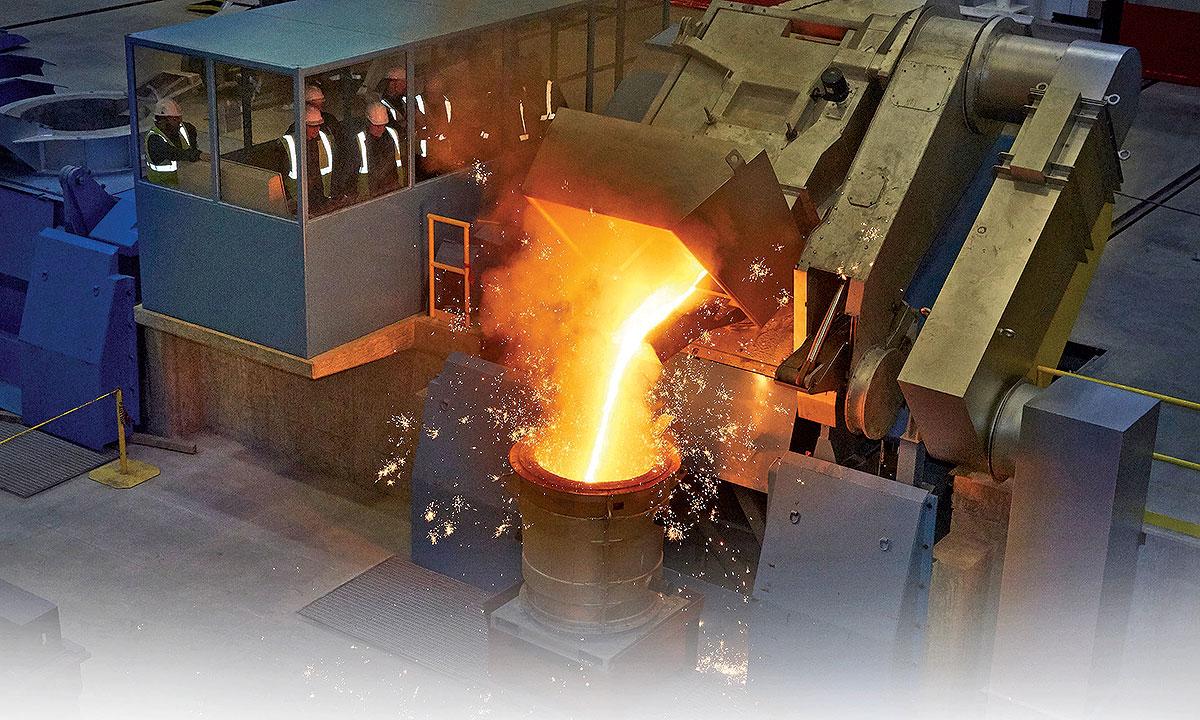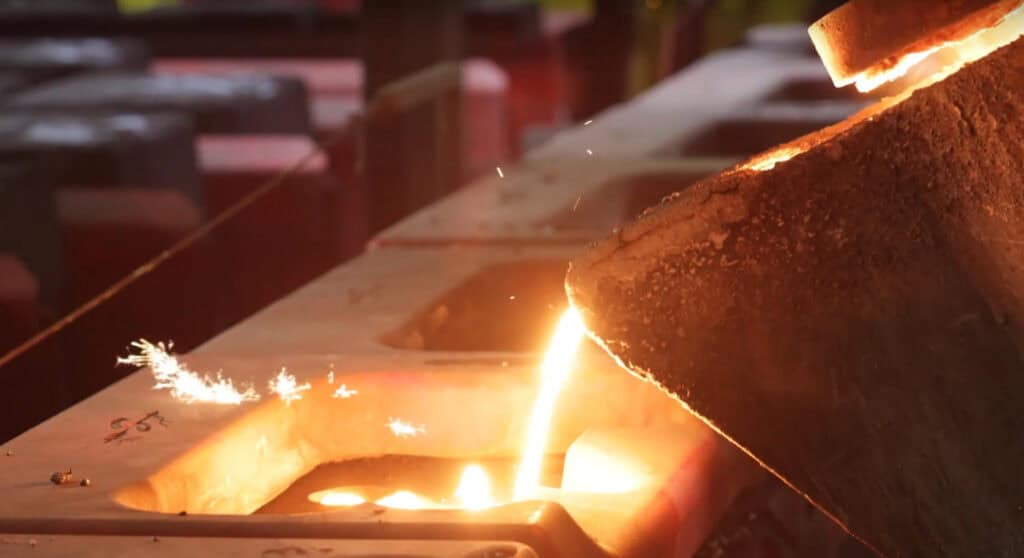Detailed overview of how an Aluminum Foundry creates and refines metal parts
Wiki Article
Just How a Metal Foundry Adds to Sustainable Metal Production Practices
Metal foundries play an important function in advertising sustainability within the metal manufacturing sector. By including recycled products, they minimize reliance on virgin resources and minimize environmental influences. Energy-efficient melting processes further decrease power consumption and exhausts. Nevertheless, the journey towards sustainable practices includes even more than just reusing and power management. It incorporates a broader commitment to ethical sourcing and innovative technologies. The implications of these methods are considerable and warrant closer exam.The Role of Recycling in Metal Foundries
While metal manufacturing has actually generally counted on virgin products, the increasing emphasis on sustainability has resulted in a considerable shift in practices, particularly in metal foundries. Recycling has actually become a crucial part of this makeover, enabling foundries to repurpose scrap metal and decrease reliance on extracted resources. By incorporating recycled materials into their processes, foundries not just lower ecological impact yet also reduced production prices.Making use of recycled steels, such as copper, steel, and aluminum, decreases power consumption and minimizes greenhouse gas emissions related to standard mining and refining methods. Moreover, foundries can accomplish top notch outputs by using sophisticated sorting and handling innovations to assure the purity of recycled products. This emphasis on recycling fosters a round economic situation, where waste is lessened, and resources are used successfully. Metal foundries play an essential duty in promoting sustainable methods within the metal manufacturing market.
Energy-Efficient Melting Strategies
Energy-efficient melting strategies are important for improving sustainability in metal manufacturing. These techniques significantly minimize power consumption during the melting process, which is among one of the most energy-intensive phases in metal manufacturing. Technologies such as induction melting, resistance heating, and microwave melting deal boosted effectiveness contrasted to conventional methods. Induction melting, as an example, uses magnetic fields to generate warmth directly within the metal, minimizing energy loss and offering precise temperature control.Additionally, executing warm healing systems can additionally improve effectiveness by recording and reusing waste heat generated throughout melting. Using advanced insulation materials and optimizing furnace layouts additionally add to power financial savings. By taking on these cutting-edge melting strategies, metal foundries can decrease their carbon impact, reduce operational prices, and contribute to a more sustainable production landscape. The assimilation of energy-efficient techniques not just straightens with environmental goals however also satisfies the growing demand for accountable production methods in the metal sector.
Lasting Sourcing of Raw Products
Sustainable sourcing of resources is crucial for decreasing the ecological impact of metal manufacturing. This includes the boosted use of recycled metals, the adoption of moral mining practices, and efforts targeted at regional sourcing. By focusing on these strategies, the sector can promote responsible resource monitoring and support local economies.
Recycled Metal Utilization
Exactly how can industries efficiently lower their environmental impact while fulfilling the growing demand for metal? One significant strategy is the application of recycled metal. By integrating scrap metal right into their production processes, foundries can lower the removal of virgin materials, therefore reducing and saving natural sources power intake. Recycled metals require much less energy to procedure contrasted to their raw counterparts, leading to reduced greenhouse gas emissions. Additionally, using recycled metal helps divert waste from landfills, promoting a circular economic climate. Industries that prioritize recycled metal not just add to sustainability but also gain from expense savings related to minimized material purchase. Subsequently, recycled metal utilization stands as a crucial strategy for environmentally accountable metal production.Moral Mining Practices
While the need for metals remains to climb, sectors are increasingly acknowledging the significance of honest mining techniques in ensuring responsible sourcing of basic materials. Ethical mining incorporates a commitment to ecological stewardship, social duty, and adherence to reasonable labor techniques. Business are currently prioritizing partnerships with mines that show openness in their procedures, minimizing ecological impact and appreciating neighborhood communities. This strategy not just fosters a lasting supply chain but also enhances the reputation of companies entailed. By implementing strenuous standards and certifications, industries can combat illegal mining activities and promote the welfare of employees. Ultimately, ethical mining practices contribute substantially to a more lasting metal production environment, aligning economic development with ecological and social honesty.Local Sourcing Initiatives

Technologies in Metal Casting Procedures
Technologies in metal casting procedures are transforming the industry by incorporating innovative recycling strategies that decrease waste. Energy-efficient melting methods are additionally being created to lower power consumption during manufacturing. Furthermore, making use of innovative mold products adds to improved performance and sustainability in Aluminum Foundry casting procedures.Advanced Recycling Techniques
Advanced recycling strategies are transforming metal casting procedures, significantly enhancing sustainability in the industry. These technologies concentrate on reprocessing and reclaiming scrap metal, significantly minimizing waste and the need for virgin materials. Strategies such as hydrometallurgy and pyrometallurgy make it possible for foundries to draw out valuable steels from used parts, guaranteeing reliable resource application. Furthermore, advanced sorting and purification modern technologies enhance the top quality of recycled steels, making them suitable for high-performance applications. This not just decreases the environmental footprint of metal manufacturing yet also promotes a round economy by promoting the reuse of products. As these reusing approaches continue to progress, they assure to even more enhance procedures within foundries and contribute to a more sustainable metal production landscape.Energy-Efficient Melting Approaches
While traditional melting techniques have long been the foundation of metal casting, current advancements have introduced energy-efficient methods that considerably decrease energy usage and exhausts. Technologies such as induction melting and electric arc heating systems have gotten prominence, enabling specific control over temperature level and reducing the requirement for fossil fuels. These techniques not only improve energy effectiveness but also promote faster melting times, which translates to lower operational costs. Additionally, developments in warm healing systems allow foundries to record and recycle excess warmth created throughout the melting procedure. This all natural strategy to power monitoring not just sustains lasting techniques however additionally positions metal foundries as leaders in the shift towards greener manufacturing procedures, further aligning with global sustainability goals.Innovative Mold Products
As the need for even more effective and sustainable metal casting procedures expands, the exploration of innovative mold materials has become a focal point in the market. Conventional mold products commonly contribute to ecological difficulties, prompting the look for options that decrease waste and energy consumption. Current advancements consist of the growth of recyclable composites and eco-friendly binders, which not just improve mold and mildew efficiency but additionally decrease ecological effect. Furthermore, the usage of 3D printing technology in mold and mildew development enables intricate layouts that decrease material usage and make it possible for rapid prototyping. These cutting-edge products not only boost casting accuracy however additionally line up with sustainability objectives, showcasing the industry's dedication to lowering its carbon footprint while preserving premium manufacturing requirements.Lowering Waste Through Advanced Innovation
Innovative innovations are transforming the metal manufacturing sector by substantially reducing waste and enhancing performance. Advanced data analytics and artificial intelligence algorithms allow foundries to enhance production processes, identifying inefficiencies and minimizing scrap product. Smart sensors keep track of devices performance in real-time, allowing for predictive upkeep that minimizes downtime and waste generation. Additionally, additive manufacturing strategies, such as 3D printing, permit the creation of complicated components with very little product use, markedly reducing waste compared to conventional techniques.
Furthermore, closed-loop systems are ending up being extra prevalent, wherein scrap metal and results are recycled back right into the manufacturing cycle, ensuring that products are utilized to their maximum possibility - Aluminum Foundry. This integration of technology not just promotes resource conservation yet additionally improves the general sustainability of metal manufacturing techniques. By accepting these improvements, foundries can add to a more lasting future while maintaining competition in the market
The Effect of Foundries on Carbon Impact Decrease
Foundries play an essential function in minimizing the carbon impact of the metal manufacturing sector by carrying out various lasting techniques. By utilizing energy-efficient technologies, such as electrical arc heating systems, these centers significantly lower greenhouse gas discharges contrasted to traditional approaches. In addition, foundries progressively take on renewable energy resources, which additionally reduces their dependence on nonrenewable fuel sources.Recycling scrap metal is one more important technique that foundries use, conserving resources and reducing the requirement for virgin products. This not only reduces waste yet also lowers the energy-intensive removal procedures related to mining. The adoption of closed-loop water systems assists to reduce water usage and decrease wastewater discharge, contributing to a more sustainable operation.
Via these campaigns, foundries show their dedication to ecological stewardship, resulting in a marked reduction in the total carbon impact of the metal manufacturing field. Their recurring initiatives are crucial in the change toward a much more lasting commercial landscape.
Regularly Asked Inquiries
What Sorts of Metals Are Most Generally Recycled in Foundries?
Light weight aluminum, steel, brass, and copper are among the most typically recycled metals in foundries. These steels are preferred as a result of their high recycling prices, financial worth, and widespread availability, contributing significantly to industrial sustainability initiatives.Just How Do Foundries Guarantee the Quality of Recycled Products?
Foundries establish the quality of recycled products via extensive screening, sorting, and purification procedures. They apply innovative modern technologies to analyze make-up and get rid of pollutants, ensuring that the recycled metals fulfill sector standards for efficiency and security.
What Certifications Exist for Lasting Foundry Practices?
Various accreditations exist for lasting foundry methods, including ISO 14001 for environmental management, ISO 50001 for power management, and LEED qualification for lasting structure methods (Aluminum Casting). These qualifications aid ensure adherence to environmental and sustainability standards in proceduresJust How Do Foundries Gauge Their Carbon Impact Reduction?
Foundries measure carbon impact decrease via tools like lifecycle assessments, power audits, and discharges tracking systems. They contrast standard exhausts to existing outcomes, assessing improvements in power performance, material usage, and eco-friendly energy adoption over time.What Are the Economic Advantages of Sustainable Metal Manufacturing?
Sustainable metal manufacturing provides financial benefits such as minimized operational prices, raised performance, improved market competition, and prospective government motivations. Furthermore, it cultivates innovation and brings in environmentally mindful consumers, eventually driving long-term success for businesses.Metal foundries play a vital duty in promoting sustainability within the metal manufacturing industry. While metal manufacturing has generally relied on virgin products, the boosting focus on sustainability has led to a considerable change in techniques, particularly in metal foundries. By including scrap metal right into their production processes, foundries can reduce the removal of virgin products, thereby decreasing and saving all-natural sources power consumption. Foundries play a necessary role in minimizing the carbon footprint of the metal manufacturing market by carrying out different lasting techniques. Recycling scrap metal is one more vital practice that foundries employ, conserving sources and reducing the requirement for virgin products.
Report this wiki page